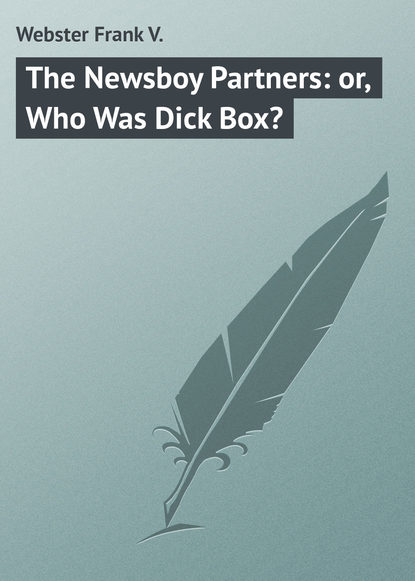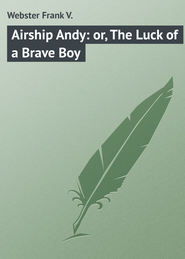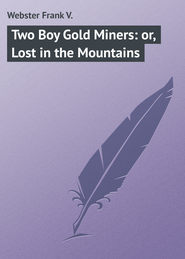По всем вопросам обращайтесь на: info@litportal.ru
(©) 2003-2024.
✖
The Newsboy Partners: or, Who Was Dick Box?
Настройки чтения
Размер шрифта
Высота строк
Поля
"What for?" and the officer looked surprised. "Are there two of 'em?"
"This fellow upset an Italian's cart by pushing me into it to-day," explained Jimmy, keeping hold of Bulldog despite the latter's efforts to get away. "I was arrested for it, and the sergeant said I should have him and Mike locked up as witnesses. Here's a note," and with much difficulty Jimmy took it out and handed it to the policeman.
"I didn't do it. It was Mike," declared Bulldog.
"Youse done it yerself," said Mike.
The policeman quickly read the note. Meanwhile Mr. Crosscrab had been holding Mike, and the crowd was now so thick that Bulldog had no chance to escape, even if he had dared risk it with an officer at hand.
"All right. I'll lock 'em both up," said the officer, taking one arm of each of the prisoners. "Make way there. I'll ring for the wagon."
"I'll do it for you," volunteered Jimmy, for he had once opened a patrol box and sent in a call for a policeman who had his hands full with a refractory prisoner.
"All right. You're a smart kid. Here's my key," and the bluecoat passed it over, temporarily letting go of Mike, but grabbing him again as the thief started to run.
Meanwhile Mr. Crosscrab had picked up his pocketbook, and with Jimmy followed the officer and his two prisoners, while the crowd trailed along in the rear. The patrol box was soon reached and Jimmy sent in the call. In a few minutes the wagon arrived, and Mike and Bulldog, both protesting their innocence, were taken to the station-house.
CHAPTER XXIII
BACK AT BUSINESS
Formalities at the police-station were soon complied with. Mr. Crosscrab made a complaint of robbery against Mike Conroy, and that bully was locked up. There was also Jimmy's charge against him, and in this was also included Bulldog, so that youth, too, was put into a cell. Mr. Crosscrab and Jimmy were told to appear in the morning as witnesses.
"Well, Jimmy," remarked Mr. Crosscrab when they were in the street once more, "you seem to be right on hand when you're wanted."
"It was mostly luck that I prevented him from robbing you though. But I did myself a good turn, for now I can be cleared of the charge of upsetting the banana cart."
"If my pocketbook had been stolen it would have meant a serious loss to me."
"How so?"
"It contains a large sum of money. I am going back to my home in Newton, Vermont, to-morrow, and I have to take quite a sum with me to conclude some business matters in which I am engaged. So if Mike had gotten away with the cash I would have been put to considerable loss."
"Then I am glad I saw him in time. When are you coming around to see me and my partner, Mr. Crosscrab? He's sick."
"I am sorry to hear that. I meant to come before this, but I have been quite busy since coming to New York. Then my aunt being taken ill made me change my plans. However, she is better now, and that is why I am going home."
"Are you coming back to New York?"
"Yes, I expect to return in about a week, and then I will be glad to call and see you. I hope Dick Box will soon be better. I never can help thinking what a queer name that is."
"It is rather odd, but we can't seem to get a better one for him nor discover his real one."
"That is too bad. I would like very much to see him, and I will just as soon as I get back. I would call to-night, only it is getting late and I have several matters to attend to. But I will see you at court in the morning."
Jimmy bade his friend good-night and hurried to the lodging-house, for he was anxious about Dick. However, he found his partner much better, and the doctor said he thought the boy would now speedily recover as his fever had entirely left him.
Mike and Bulldog were given a preliminary hearing the next day. On the charge of theft Mike was remanded in heavy bail for the Grand Jury's action, and Bulldog was also held as a witness. Then Jimmy was arraigned on the charge, made by the policeman, that he had tipped over the Italian's cart.
But the previous complaints against the two youths had their effect on Jimmy's case. He told his story, saying how Bulldog and Mike had pushed him, and the Italian, who had calmed down to a considerable extent, gave such testimony that it convinced the magistrate Jimmy was telling the truth. Mike and Bulldog were questioned, and finally had to admit that they were the guilty ones.
So they were convicted on that charge, and were sentenced to pay a fine of ten dollars each. As they did not have the money, and could not get bail on the other charge, they were taken to the Tombs prison, while Jimmy was allowed to go. Incidentally the magistrate complimented Jimmy on the manner in which he had caused the arrest of the two young criminals.
"Well, I suppose I will have to appear later when Mike's regular trial comes off," remarked Mr. Crosscrab as he parted from Jimmy in front of the police court. "But that will not be for some time. Now I am off for Vermont, but I will not forget to see you when I return. Give my regards to your partner, in whom, though I have never seen him, I take a great deal of interest. Poor Dick Box; I must help you to find a better name for him when I get back."
"I wish you would. The police can't seem to help him."
"Then I will. Good-by, Jimmy."
"Good-by, Mr. Crosscrab."
Jimmy started back to work with a lighter heart than he had had in many a day, and the principal cause of it was that Dick was getting better. He would be able to be out in a few days, the doctor said.
So Jimmy hustled around and sold a large number of papers. Frank Merton and Sam Schmidt had been helping the partners, and business had not been so bad, though of course the profits were largely taken up in paying the two boys who did Dick's work.
One afternoon, at the close of the day's business, Sam Schmidt came to Jimmy with every appearance of excitement.
"What's the matter, Sam?" asked Jimmy. "Found a pocketbook full of bills?"
"Nope, but I haf alretty found somedings else."
"What is it?"
"I haf found der advertisement about dot Box feller."
"What! About Dick? Have you found something about him in the paper?" for Sam had not given up looking for a notice in the personal columns of the papers, which might refer to the strange new boy who had come into the midst of the news-lads.
"For sure, I haf. Here it iss," and Sam pulled out a piece torn from the Herald.
"Read it," said Jimmy. "I ain't quite quick enough on me – I mean my – words yet. You read it."
"Vell, I am not so good on der Englishness of it, but dis is vot it means. 'If der boy vot runned avay from his home vill come back all vill be forgiveness, und der money he took to go und fight der Indians mit, he can keep, for his mudder und his fadder is sorrowfulness mitout him, und vould he please write or sends a message und all vill be vell, und he kin haf der pony und der bicycle vot he wants.' Dot's all dere is to it."
"But don't it say who he is – who the kid is? – though I don't believe it's Dick that's meant."
"Sure it says who it is vot put it in der paper," replied Sam. "It says dot der boy is to address Mr. Samuel Wonsonski, New York City."
"Then it ain't Dick," decided Jimmy.
"Vy not? Ain't it got referenceness to a boy vot runned avay; und ain't Dick a runavay?"
"I don't know as he is. Anyhow, this can't be about him."
"Vy not?"
"Because this is the name of either a Jew or a Russian, and Dick's an American."
"Oh, maybe dot's so," agreed Sam. "But you can't always sometimes tell. Maybe he is a part Jew and part Russian and part American. Ve had better ask him, I dinks."










